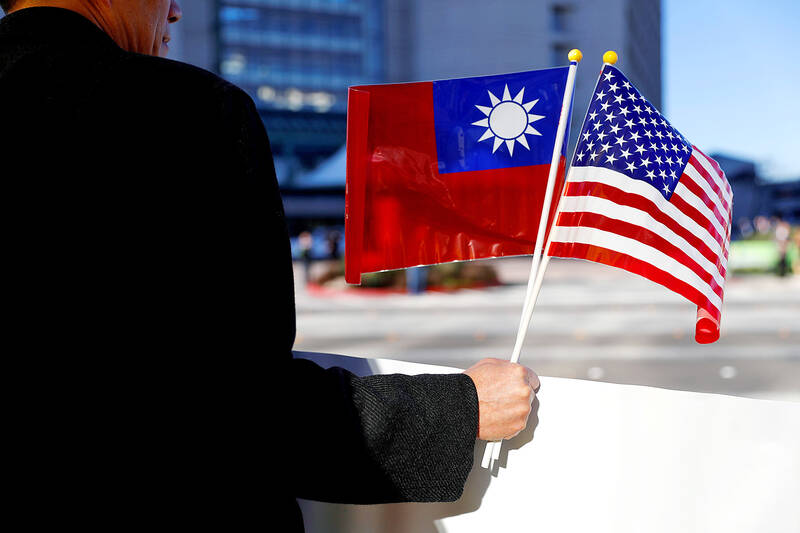A US plan to send 10 officials to study and intern in Taiwan every two years is crucial for the two sides to build trust, Democratic Progressive Party Legislator Wang Ting-yu (王定宇) said.
The US Senate last month passed the Fiscal 2023 National Defense Authorization Act (NDAA), which approved US$2 billion in annual military grants to Taiwan.
One noteworthy part of the NDAA is that it includes the Taiwan Fellowship Act, Wang, who chairs the legislature’s Foreign Affairs and National Defense Committee, said on Sunday.

Photo: Reuters
Under the fellowship act, the US would send 10 federal government employees to live in Taiwan on a two-year fellowship, during which they would spend one year learning Mandarin and about local issues, and the other interning in the public sector, he said.
Such programs enable grassroots civil servants to interact with each other, so that when they become senior officials, they can communicate directly with counterparts in the other country whom they are familiar with, he said.
The fellowship act was inspired by past exchanges between the US and Japan, and such programs have helped build a stable relationship between the US and Japan, he said.
Asked whether the US might intervene in Taiwan’s domestic affairs through such programs, Wang said that they were “thinking too much.”
Taiwan can provide internship opportunities in the public sector for US officials, he said, adding that the Industrial Technology Research Institute might be a good option as its employees are not limited to civil servants.
The main purpose of the act is to create channels for the two countries to exchange not in national defense or security, but in the economy and healthcare, he said.
Asked whether internship opportunities could become available in the US for Taiwanese civil servants, Wang said that more interactions with other countries would be beneficial to Taiwan.
Engaging in international exchanges without compromising Taiwan’s dignity, interests and laws would provide good opportunities for young Taiwanese civil servants, he said.
DPP Legislator Lo Chih-cheng (羅致政) said that the details of the fellowship, including the officials the US would send to Taiwan and the agencies that would provide the internships, are still being deliberated.
The program “is undoubtedly going to cement the relationship between Taiwan and the US,” he said.
If a situation demands the two sides to work together, whether in a time of calm or in an emergency, the exchange would demonstrate its effectiveness, he said.
Lo said he thinks that people who are concerned about the US intervening in Taiwan’s domestic affairs “worry too much,” as exchanges between civil servants and military personnel from different countries are normal.

Taiwan would welcome the return of Honduras as a diplomatic ally if its next president decides to make such a move, Minister of Foreign Affairs Lin Chia-lung (林佳龍) said yesterday. “Of course, we would welcome Honduras if they want to restore diplomatic ties with Taiwan after their elections,” Lin said at a meeting of the legislature’s Foreign Affairs and National Defense Committee, when asked to comment on statements made by two of the three Honduran presidential candidates during the presidential campaign in the Central American country. Taiwan is paying close attention to the region as a whole in the wake of a

President William Lai (賴清德) has appointed former vice president Chen Chien-jen (陳建仁) to attend the late Pope Francis’ funeral at the Vatican City on Saturday on his behalf, the Ministry of Foreign Affairs said today. The Holy See announced Francis’ funeral would take place on Saturday at 10am in St Peter’s Square. The ministry expressed condolences over Francis’ passing and said that Chen would represent Taiwan at the funeral and offer condolences in person. Taiwan and the Vatican have a long-standing and close diplomatic relationship, the ministry said. Both sides agreed to have Chen represent Taiwan at the funeral, given his Catholic identity and

Chinese Nationalist Party (KMT) Chairman Eric Chu (朱立倫), spokeswoman Yang Chih-yu (楊智伃) and Legislator Hsieh Lung-chieh (謝龍介) would be summoned by police for questioning for leading an illegal assembly on Thursday evening last week, Minister of the Interior Liu Shyh-fang (劉世芳) said today. The three KMT officials led an assembly outside the Taipei City Prosecutors’ Office, a restricted area where public assembly is not allowed, protesting the questioning of several KMT staff and searches of KMT headquarters and offices in a recall petition forgery case. Chu, Yang and Hsieh are all suspected of contravening the Assembly and Parade Act (集會遊行法) by holding

Lawmakers from the Democratic Progressive Party (DPP) yesterday established a friendship group with their counterparts in Ukraine to promote parliamentary exchanges between the two countries. A ceremony in Taipei for the Taiwan-Ukraine Parliamentary Friendship Association, initiated by DPP Legislator Chen Kuan-ting (陳冠廷), was attended by lawmakers and officials, including Deputy Minister of Foreign Affairs Francois Wu (吳志中) and European Economic and Trade Office in Taiwan Director Lutz Gullner. The increasingly dire situation in Ukraine is a global concern, and Taiwan cannot turn its back when the latter is in need of help, as the two countries share many common values and interests,